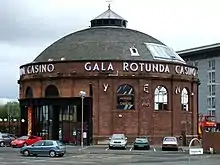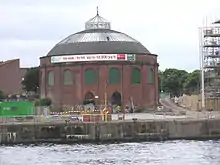Glasgow Harbour Tunnel Rotundas
The Glasgow Harbour Tunnel Rotundas are two red brick stone rotundas which flank the River Clyde in Glasgow, Scotland. The North Rotunda is located on Tunnel Street in the Finnieston area of Glasgow with the South Rotunda at Plantation Place in Govan.


History
Designed by Simpson and Wilson,[1] and built between 1890 and 1896[2] by Glasgow Tunnel Company,[3] the Rotunda covered 24-metre-deep (79 ft) shafts[4] to tunnels which enabled vehicular and pedestrian access to the other side of the river.
Pedestrians, horses and carts – and later motor vehicles – would be hauled up by hydraulic lifts provided by Otis Elevator Company of New York.[3]
During the Second World War, the tunnels were temporarily closed because all the metal from the lifts was removed to contribute to the war effort.[4]
The tunnels were an expensive venture to run and were passed to the council to run as a service in 1926.[5]
The increased costs of running the tunnels which were prone to damp and the increase of motor cars on the roads lead to the closure of the pedestrian tunnel in 1980,[2] and the vehicular tunnels being filled in 1986.[3] Though the pedestrian tunnel still exists, it is closed to the public.
Originally, three-storey red and white brick towers stood alongside the Rotundas, containing the hydraulic accumulators that powered the lifts, but these have been demolished.[4]
Other uses
Over the years, the Rotundas have served many functions including during the Glasgow Garden Festival in 1988 when one housed a replica of the famous Nardini’s ice cream parlour in Largs.[6] The site has also served as a science centre, The "Dome of Discovery", which was funded by Glasgow City Council and BP Exploration to "celebrate the scientific and industrial culture of the city".
In 2014, the National Theatre of Scotland took over the South Rotunda, with "The Tin Forest" project, creating a pop-up arts venue for performance and visual art as part of Festival 2014, the Commonwealth Games strand of the Glasgow 2014 Cultural Programme.[7]
Current use
The North Rotunda is currently a restaurant known as Cranside Kitchen, and a wedding venue. The South Rotunda has been adapted as an office for a local shipping and marine engineering company.[8]
The two Rotundas are category B listed buildings,[1][9] with the South Rotunda identified as being "at risk".[10]
References
- Historic Environment Scotland. "100 Govan Road, Glasgow Harbour Tunnel, otherwise known as Finnieston Tunnel Shaft and Rotunda (Category B Listed Building) (LB33528)". Retrieved 20 March 2019.
- "North Rotunda - Glasgow". Retrieved 19 December 2015.
- "BBC - Scotland - Coast". Archived from the original on 19 November 2013. Retrieved 19 November 2013.
- Digital, Innovation. "North Rotunda and Harbour Tunnel, River Clyde Glasgow, Clyde Waterfront Heritage Guide". www.clydewaterfront.com.
- "1ST CLYDE TUNNEL". Archived from the original on 10 June 2015. Retrieved 19 December 2015.
- "hidden glasgow:: Finnieston tunnel; Glasgow Harbour Tunnel; North Rotunda; South Rotunda; Clyde Tunnel". Retrieved 19 December 2015.
- "Derelict Rotunda to host arts events at 2014 Games". Herald Scotland. Retrieved 19 December 2015.
- "South Rotunda Update | Malin Group". www.malingroup.com. Archived from the original on 20 December 2016. Retrieved 22 May 2022.
- Historic Environment Scotland. "28 Tunnel Street, Glasgow Harbour Tunnel, otherwise known as Finnieston Tunnel, Shaft and Rotunda (Category B Listed Building) (LB33203)". Retrieved 20 March 2019.
- "Glasgow Harbour Tunnel South Rotunda, 1, Plantation Place, Govan". Archived from the original on 22 December 2015. Retrieved 19 December 2015.
External links
- Video footage of the North & South Rotundas
 Media related to Glasgow Harbour Tunnel Rotundas at Wikimedia Commons
Media related to Glasgow Harbour Tunnel Rotundas at Wikimedia Commons